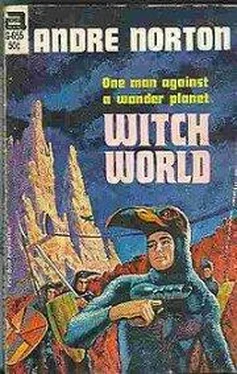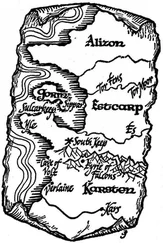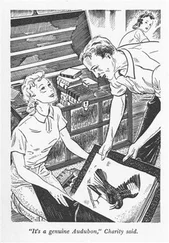On one side was the sea, quiet enough now, washing the tangles of weed ripped loose and deposited on the shore. Fronting the water was a cliff face, broken, with handholds enough, Simon supposed. But he had not the slightest desire to essay that climb, or to move, for that matter. It was good just to sit and let the warmth of the sun drive out the bitter cold of storm and water.
“Saaa…”
One of the other figures on the strand stirred. A long arm swept the sand, pushing away a mass of weed. The man coughed, retched, and raised his head, to stare blearily about. Then the Captain of Estcarp caught sight of Simon and regarded him blankly, before his mouth moved in an effort at a grin.
Koris hunched up, his over-heavy shoulders and arms taking most of his weight as he crawled on hands and knees to a clear space of water-flattened sand.
“It is said on Gorm,” he spoke rustily, his voice hardly more than a croak, “that a man born to feel the weight of the headsman’s ax on his neck does not drown. And, since it has ofttimes been made clear to me that the ax is my fate — see how the oldsters are proven right once again!”
Painfully he moved on to the nearest of the still prone men, and rolled the limp body over, exposing a face which was grey-white under its weathering. The Guardsman’s chest rose and fell with steady breath and he appeared to have no injuries.
“Jivin,” Koris supplied a name, “an excellent riding master.” He added the last thoughtfully, and Simon found himself laughing weakly, pressing his fists against his flat middle where strained muscles protested such usage.
“Naturally,” he got out between those bursts of half-hysterical mirth, “that is an employment most needed now!”
But Koris had gone on to the next intact body.
“Tunston!”
Dimly Simon was glad of that. He had developed, during his short period of life with the Guard in Estcarp, a very hearty respect for that under officer. Making himself move, he helped Koris draw the two still unconscious men above the noisome welter of tide drift. Then clawed his way to his feet with the aid of the rock wall.
“Water—” That sense of well-being which had held him for a short space after his own awakening was gone. Simon was thirsty, his whole body now one vast longing for water, inside and out, to drink and to lave the smarting salt from his tender skin.
Koris shuffled over to examine the wall. There were only two ways out of the cup which held them. To return to the sea and strive to swim around the encircling arms of rocks, or to climb the cliff. And every nerve within Simon revolted against any swimming, or return to the water from which he had so miraculously emerged.
“This is not too hard a path,” Koris said. He was frowning a little. “Almost could I believe that once there were hand holds here and here.” He stood on tiptoe, flattened against the rock, his long arms stretched full length over his head, his fingers fitting into small openings in the cliff wall. Muscles roped and knotted on his shoulders; he lifted one foot, inserted the toe of a boot into a crevice and began to climb.
Giving a last glance at the beach and the two men now well above the pull of the water, Simon followed. He discovered that the Captain was right. There were convenient hollows for fingers and toes, whether made by nature or man, and they led him up after Koris to a ledge some ten feet above the level of the beach.
There was no mistaking the artificial nature of that ledge, for the marks of the tools which had shaped it were still visible. It slanted as a ramp, though steeply, toward the cliff top. Not an easy path for a man with a whirling head and a pair of weak and shaking legs, but infinitely better than he had dared to hope for.
Koris spoke again. “Can you make it alone? I will see if I can get the others moving.”
Simon nodded, and then wished that he had not tried that particular form of agreement. He hugged the wall and waited for the world to stop an unpleasant sidewise spiral. Setting his teeth, he took the upgrade. Most of the journey he made on his hands and knees, until he came out under a curving hollow of roof. Nursing raw hands he peered into what could only be a cave. There was no other way up from here, and they would have to hope that the cave had another opening above.
“Simon!” The shout from below was demanding, anxious.
He made himself crawl to the outer edge of the ledge and look down.
Koris stood there below, his head thrown far back as he tried to see above. Tunston was on his feet, too, supporting Jivin. At Simon’s feeble wave they went into action, somehow between them getting Jivin up the first climb to the ledge.
Simon remained where he was. He had no desire to enter the cave alone. And anyway his will appeared to be drained out of him, just as his body was drained of strength. But he had to back into it as Koris gained the level and faced about to draw up Jivin.
“There is some trick to this place,” the Captain announced. “I could not see you from below until you waved. Someone has gone to great trouble to hide his doorway.”
“Meaning this is highly important?” Simon waved to the cave mouth. “I do not care if it is a treasure house of kings as long as it gives us a chance of reaching water!”
“Water!” Jivin echoed that feebly. “Water, Captain?” he appealed to Koris trustfully.
“Not yet, comrade. There is still a road to ride.”
They discovered that Simon’s chosen method of hands and knees was necessary to enter the cave door. And Koris barely scraped through, tearing skin on shoulders and arms.
There was a passage beyond, but so little light reached this point that they crept with their hands on the walls, Simon tapping before him.
“Dead end!” His outstretched hands struck against solid rock facing them. But he had given his verdict too soon, for to his right was a faint glimmer of light and he discovered that the way made a right-angled turn.
Here one could see a measure of footing and they quickened pace. But disappointment waited at the end of the passage. For the light did not increase and when they came out into an open space, it was into twilight and not the bright sun of day.
The source of that light riveted Simon’s attention and pulled him out of his preoccupation with his own aches and pains. Marching in a straight line across one wall were a series of perfectly round windows, not unlike ship’s portholes. Why they had not sighted them from the strand, for it was apparent that they must be in the outer surface of the cliff, he could not understand. But the substance which made them filtered the light in cloudy beams.
There was light enough, however, to show them only too clearly the single occupant of that stone chamber. He sat at ease in a chair carved of the same stone as that on which it was based, his arms resting upon its broad side supports, his head fallen forward on his breast as if he slept.
It was only when Jivin drew breath in a sound close to a sob, that Simon guessed they stood in a tomb. And the dusty silence of the chamber closed about them, as if they had been shut into a coffer with no escape.
Because he was awed and ill at ease, Simon moved purposefully forward to the two blocks on which the chair rested staring up in defiance at the one who sat there. There was a thick coating of dust on the chair, sifting over the sitter. Yet Tregarth could see that this man — chieftain, priest, or king, or whatever he had been in his day of life — was not allied by race to Estcarp or to Gorm.
His parchment skin was dark, smooth, as if the. artistry of the embalmer had turned it to sleek wood. The features of the half hidden face were marked by great force and vigor with a sweeping beak of nose dominating all the rest. His chin was small, sharply pointed, and the closed eyes were deep set. It was like seeing a humanoid creature whose far distant ancestors had been not primates but avian.
Читать дальше








